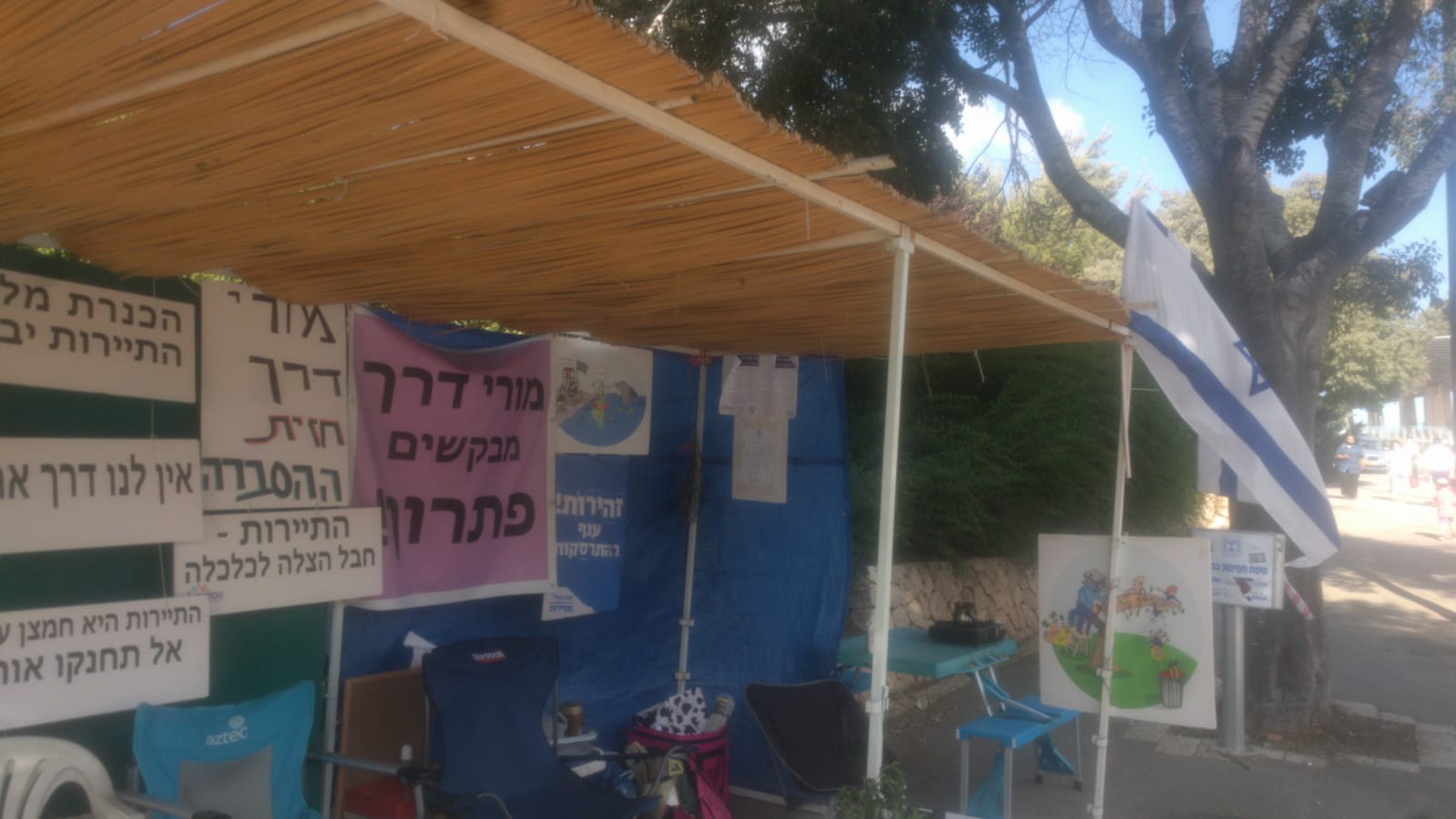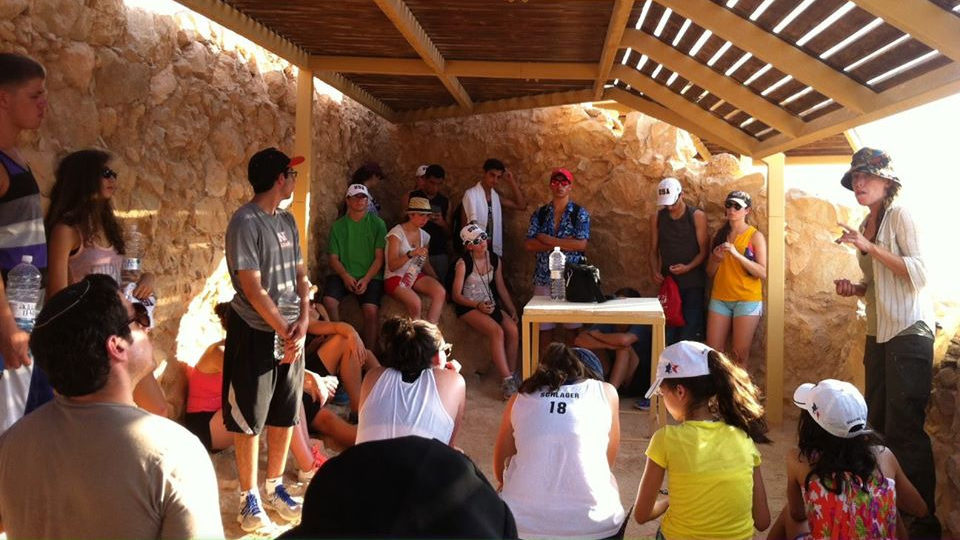Israeli Gov’t Announces Plan to Integrate Tour Guides Into Education System
Guides put out of work by coronavirus say Tourism and Education ministries’ plan is not enough, government isn’t listening to their ideas
For nearly two months, Yaka Square in Jerusalem, sandwiched between the Finance Ministry and the Knesset, has been the scene of a hunger strike by tour guides frustrated at the government’s response to the coronavirus pandemic that has devastated their industry.

Site of the tour guides’ hunger strike, Yaka Square, Jerusalem. (Courtesy Lena Drubachevsky)
On Monday, the Tourism Ministry announced that licensed tour guides would be able to apply to an Education Ministry hiring program for educational assistants in grades three through four during the upcoming school year at an hourly wage of up to 75 shekels (about $22).
“It is hoped that many tour guides will be included among those selected to work as educational aides in schools during the upcoming academic year, alongside those from other professions,” the Tourism Ministry said in a statement sent to The Media Line.
“The response to the economic corona crisis demands creativity and flexibility, and this project could possibly serve as a model to other countries if proven successful,” the statement added.
But will this program be enough to financially sustain incoming tour guides dealing with zero activity since the skies closed?
Speaking to The Media Line from the hunger strike, Yoni Shapira, chairperson of the Moreshet Derech Israel Incoming Tourist Guide Association, called the Tourism Ministry announcement a “pathetic” response to a letter that went out last week to the Tourism and Education ministries with what he said were about 50 ideas specifically for tour guides.
“It’s a very pathetic approach of ministerial offices saying, ‘Yes, we managed to do something. Here it is. Go for it,’” Shapira said.
The program’s application site states that registration is open until August 14. The program starts in September with the opening of schools. The hours are up to 25 hours a week after 15 hours of training.
Applicants must have a professional certificate and experience ranging from teaching abroad to working with children to holding a degree in education.
It’s a very pathetic approach of ministerial offices saying, ‘Yes, we managed to do something. Here it is. Go for it
Iris Wolf, director of senior training and Specialization Division teaching officer at the Education Ministry, emphasized to The Media Line that the program is not only for tour guides.
“We uploaded the [application] link and, after 24 hours, there were more than 10,000 that already submitted, and not all of them are from the tourism office,” Wolf said. “So, we just have to make sure that we understand that they are only one part of the population that will submit for this program.”
Wolf said that they targeted different populations with the experience and background to fit the program, for example, contacting the Jewish Agency for Israel about emissaries who came back to Israel after teaching abroad in Jewish institutions for a year.
One of the ideas in the letter sent by Shapira involves the ability of tour guides to speak in several languages, including English, French and Arabic.
“We can teach in languages. We can tour in languages. Why not use it? We will assist you if there is a high school English class right now limited to Zoom activity because they don’t have a facility to sit in. Why not? Let’s do a tour in English, in the area of the neighborhood, in the area of the school, in the area of the town or the municipality. A heritage tour. Learning plus a tour of the neighborhood,” Shapira said.
Licensed tour guide Hannah Rosenberg, founder of Cheers to Israel Tours, told The Media Line that she speaks “army Hebrew” and that her primary language is English.
“Most of the programs the government has made for guides leave out the many of us that guide in English,” Rosenberg said. “It’s decent work for the good Hebrew speakers but I doubt it would help me.”

Hannah Rosenberg, right, gives her first official tour after getting her tour guide license, with her father. (Courtesy Hannah Rosenberg, Cheers to Israel Tours)
Shapira said that the problem is that the government is financially assisting the big hotels, airlines and travel agents but not the suppliers of the tourism experience, who, he said, are about 25,000 companies that create 80% of the tourism economy and have between one and five employees.
“No one is getting any assistance and they are creating most of the tourism business,” Shapira said.
We can teach in languages. We can tour in languages. Why not use it?
Wolf said that the government is trying to find ways to make the best out of a bad situation.
“We’re in a great unbelievable challenge that the coronavirus brought us and we’re trying to look all over and find solutions and to help,” Wolf said.
Licensed tour guide Lena Drubachevsky, who has been working at Archaeological Seminars for the past 10 years and is opening a project called The Dig Team, told The Media Line that she applied for the program but still had a lot of questions. One of these: Will there be an option for permanent teaching positions? According to Drubachevsky, it could take two to four years for tourism to recover to full capacity and it might never completely recover.
“We need a working program at this point. We needed it a long time ago. And Israeli society needs it too,” Drubachevsky said. “We can help deal with the new challenges that coronavirus has faced us with. We can and want to be contributing and essential members of Israeli society as we have always been. We are a resource that Israel can’t afford to lose.”
Related stories:


